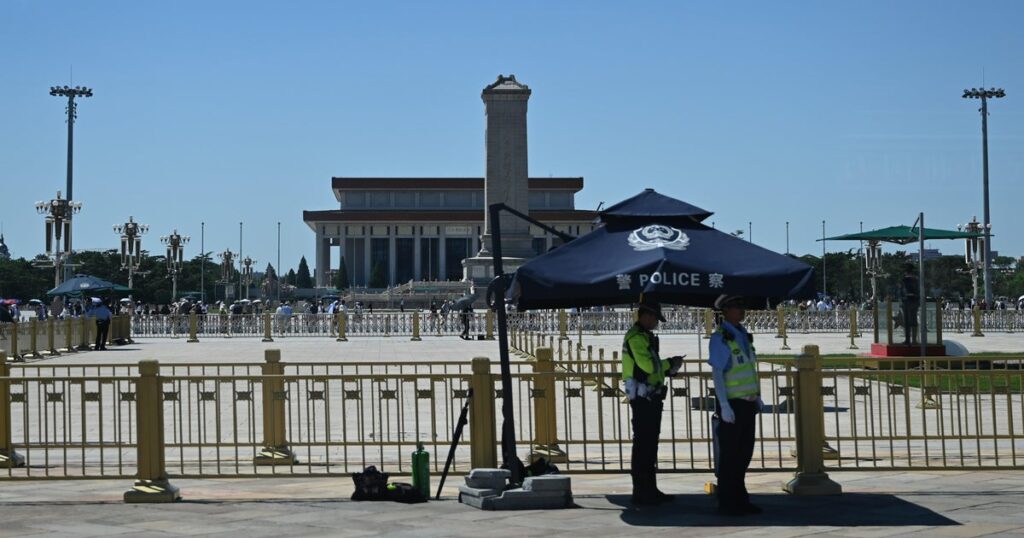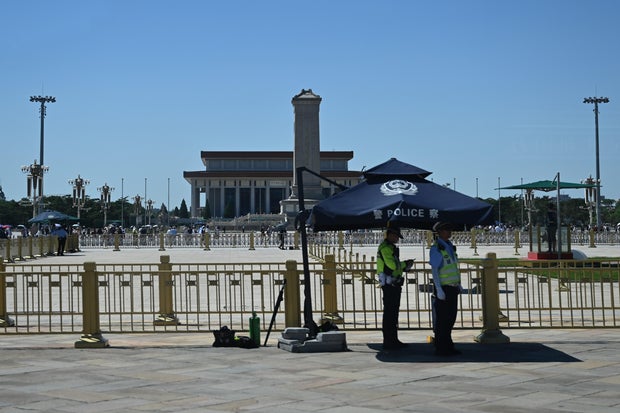Beijing hit back Wednesday at Secretary of State Marco Rubio for saying the world will “never forget” the deadly Tiananmen Square crackdown in 1989, describing his remarks as an “attack” on China.
Chinese troops and tanks forcibly cleared peaceful protesters from the square in the capital on June 4, 1989 after weeks-long demonstrations demanding greater political freedoms.
The exact toll is unknown but hundreds died, with some estimates exceeding 1,000 people.
China’s communist rulers have since sought to erase any public mention of the crackdown, with censors scrubbing all online references and foreign media warned over their coverage of the 36-year mark.
Mike Wallace’s “60 Minutes” report on the secret Tiananmen papers
Police were seen by AFP on Wednesday at the entrance to Wan’an Cemetery, a site in west Beijing where victims of the crackdown are known to be buried.
Officers were also posted at several intersections leading into Tiananmen Square on Chang’an Avenue, a broad thoroughfare that is placed under tight security throughout the year.
Johannes Neudecker / picture alliance via Getty Images
Rubio said in a statement the “world will never forget” what happened on June 4, even as Beijing “actively tries to censor the facts.”
“Today we commemorate the bravery of the Chinese people who were killed as they tried to exercise their fundamental freedoms, as well as those who continue to suffer persecution as they seek accountability and justice for the events of June 4, 1989,” Rubio said.
Chinese foreign ministry spokesman Lin Jian hit back during a Wednesday briefing in the capital, saying Beijing had “lodged a solemn protest” over Rubio’s comments.
“The erroneous statements by the US side maliciously distort historical facts, deliberately attack China’s political system and developmental path, and seriously interfere in China’s internal affairs,” Lin said.
Taiwanese President Lai Ching-te echoed Rubio’s remarks, vowing to preserve the memory of victims of the bloody crackdown.
“Authoritarian governments often choose to be silent and forget history; democratic societies choose to preserve the truth and refuse to forget those who have contributed to the ideal of human rights and their dreams,” Lai said on Facebook.
China claims Taiwan is part of its territory and has threatened to seize the democratic island by force.
Hong Kong commemorations banned
In Hong Kong, jailed activist Chow Hang-tung began a 36-hour hunger strike on Wednesday, a dogged attempt to individually commemorate the mark in a city that once hosted huge public remembrances.
The former lawyer used to help organize an annual vigil that drew tens of thousands to the city’s Victoria Park.
PETER PARKS / AFP via Getty Images
Hong Kong had been the only place under Chinese rule where commemoration of the crackdown was tolerated.
Slogans at the candlelight vigils sometimes called for democracy in China and an end to one-party rule.
But after huge and sometimes violent protests roiled the city in 2019, Beijing brought in a wide-ranging national security law that has quashed political dissent.
The public memorial has effectively been banned and Chow imprisoned, facing a potential life sentence on subversion charges.
Over the last few years, activists have been detained for “offences in connection with seditious intention” around the anniversary.
In a social media post, Chow said her hunger strike would “commemorate this day and reaffirm our commitment”.
She called the city’s national security officers “real ‘criminals'” and urged authorities to apologise to her over her “wrongful” imprisonment.
“History tells us that (the apology) will likely take a very long time — the Tiananmen Mothers have been waiting for 36 years and still have not received an apology,” she said, referring to an activist group made up of families of victims of the crackdown.
A video featuring 87-year-old Zhang Xianling, whose 19-year-old son was killed in 1989, circulated online last week.
China’s authorities have never addressed the group’s plea for dialogue around the issue — instead, they have used all means to monitor and wiretap members of the Tiananmen Mothers, Zhang said.


